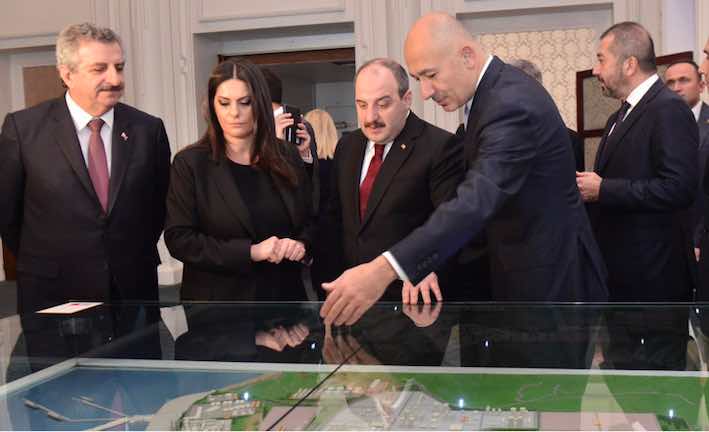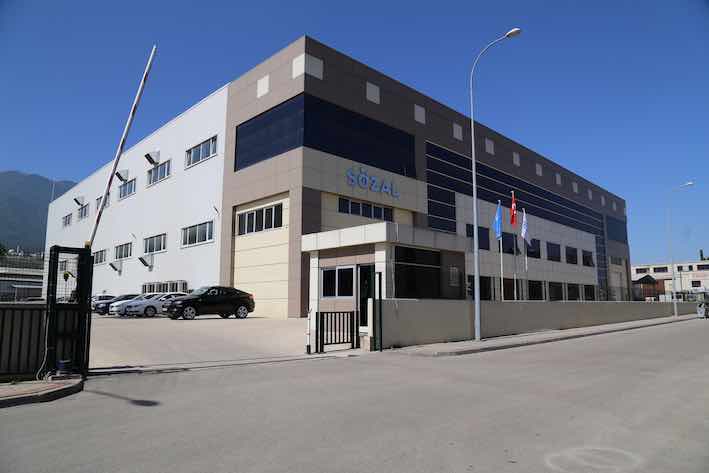 Rönesans Holding partnered with Algerian national energy company Sonatrach to develop a polypropylene production plant in the Ceyhan Mega Petrochemistry Industry Zone with a $1.2 billion investment
Rönesans Holding partnered with Algerian national energy company Sonatrach to develop a polypropylene production plant in the Ceyhan Mega Petrochemistry Industry Zone with a $1.2 billion investment
The proposed facility, which will become the first investment in the area, will feature a production capacity of 450,000 tonnes. Set to become operational in 2023, the facility will reduce current deficit by $ 450 to 500 million each year.
The contract for the development of the “Polypropylene Production Facility”, a joint investment by Rönesans Holding and Algerian national energy company Sonatrach, was signed by Rönesans Holding President Dr. Erman Ilıcak and Sonatrach CEO Abdelmoumen Ould Kaddour on November 28 in a ceremony that was attended by Mustafa Varank, Republic of Turkey Minister of Industry and Technology. The facility, which will have an annual production capacity of 450,000 tonnes, will be built in the Ceyhan Mega Petrochemistry Industry Zone with an estimated completion date in 2023.
Set to reduce national deficit by $450 to 500 million
Speaking at the signing ceremony, Dr. Erman Ilıcak said: “Turkey currently imports polypropylene, a raw material used in the production of plastics. The country imports 2.2 million tonnes of polypropylene, 2.6 million tonnes of polyethylene and 1.5 million tonnes of PVC per year, which corresponds to 3 to 4 percent of total global consumption, and 90 percent of Turkey’s raw material need in this sector. Today, we have set on a new path to close this deficit. We are taking giant strides forward. This investment will reduce Turkey’s national deficit by $450 to 500 million each year.”
A new hub of employment for the entire region
The reason for choosing Ceyhan, Adana as the location of the investment was its proximity to Gaziantep, which is among the world’s top consumers of polypropylene, explained Dr. Ilıcak. “We are carrying out this petrochemistry investment, which was originally announced by Mr. President in February during his visit to Algeria, in partnership with Sonatrach, the national energy company of Algeria, which is a close friend of Turkey in the region.
The facility we will develop together will feature an annual production capacity of 450,000 tonnes. It will create 2,000 to 2,500 jobs during the construction phase, which will begin in 2019 and end in around 36 months. And we estimate that the investment amount will be US$ 1,2 billion. We will officially enter into operation in 2023, which is an important year for our country. Starting from that date, the Polypropylene Production Plant will provide an employment opportunity to 500-600 people including the Adana region.”
Attending to the meeting, Sonatrach CEO A. Ould Kaddour stated that the investment will build a synergy between two countries and said, “Turkey and Algeria have very deep and historical bonds. We also have strong economic bonds. We launched several investments together. I believe the polypropylene production plant we will establish in partnership with the Rönesans Holding will further contribute to these strong bonds and will build a synergy.”
30 percent of the foreign trade deficit is related to petrochemistry import
Polypropylene to be produced at the plant, which the investment will be started by Rönesans Holding, is among the raw materials imported by Turkey. According to the information provided by the Industry and Trade Minister Mustafa Varank, Turkey spent US$ 38 billion for import in the chemical industry in 2017. The foreign trade deficit last year solely by the petrochemistry industry is US$ 13 billion. This amount corresponds to 30 percent to the foreign trade deficit in manufacturing industry.
Turkey imported more than 2 million metric tons of polypropylene in 2017. With this investment, it is planned to substitute 25 percent of the polypropylene import of Turkey. In addition to this, it is estimated that the investment will provide an annual contribution of US$ 450-500 million in closing the deficit. As a critical substance in plastic industry, polypropylene is used in almost every area from agriculture to defense industry, automotive to construction, and consumer products to the pharmaceuticals and health sector.





